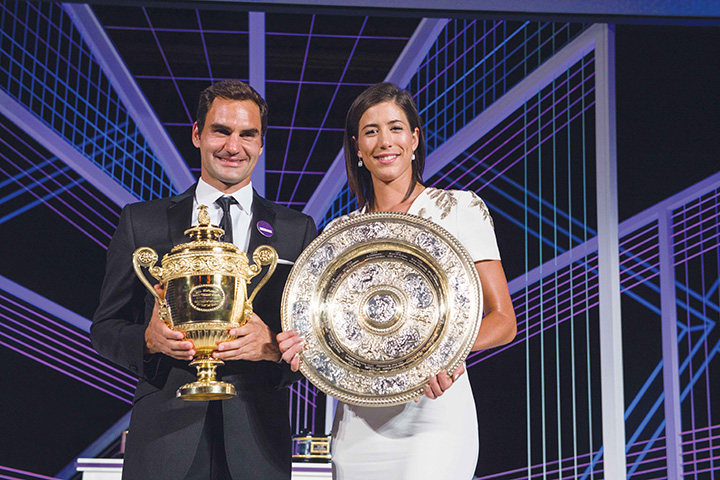
“I love to play. I have a wonderful team. My wife is totally fine with me still playing, she’s my No. 1 supporter, she’s amazing.”
Roge Federer has been celebrating winning an unprecedented eighth Wimbledon title. The Swiss tennis champ beat Marin Cilic in straight sets to get his hands on the prestigious golden trophy and make sporting history. The Duke and Duchess of Cambridge were watching from the Royal Box on Centre Court, while a host of celebrities were also at the event including Hollywood stars Uma Thurman, Eddie Redmayne, Sienna Miller and Andrew Garfield. Watching from the player’s box was Roger’s wife Mirka and the couple’s four children – Charlene, Myla, Lenny and Leo. Speaking after his win, Roger – who took six months off after losing in the Wimbledon semi-finals last year – said: “I put in a lot of work and it paid off.” He also spoke about the support he has from his wife and family, his ambitions for the future and what he thinks has made him one of the most successful tennis players ever.
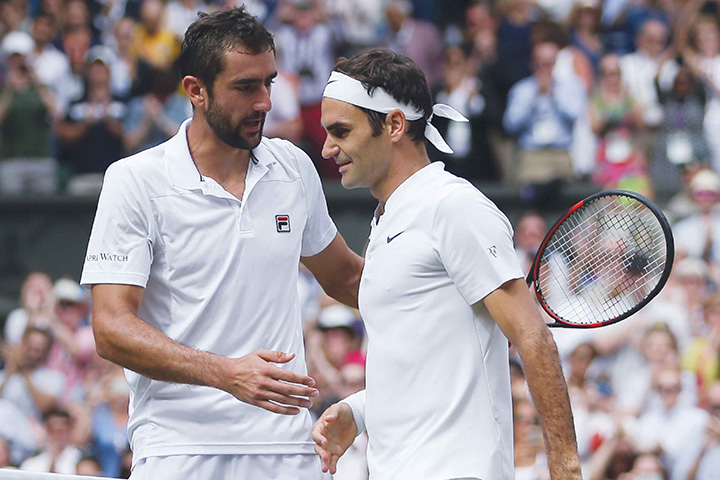
Congratulations on winning your eighth Wimbledon title. When you first you’re your idol Pete Sampras in 2001 could you ever imagine getting to this achievement?
ROGER FEDERER: Yeah no, I didn’t think I was going to be this successful after beating Pete [Sampras] here. I hoped to have a chance maybe one day to be in a Wimbledon Finals and have a chance to win the tournament so winning eight is not something you can ever aim for in my opinion and if you do, I don’t know, you must have so much talent and parents and coaches who push you from the age of three on, who think that you are like a project. I was not that kid.
“I was just a normal guy growing up in Basel and hoping to make a career on the tennis tour. And I guess I dreamed, I believed and really hoped that maybe I could actually do it, to make it real. So I put in a lot of work and it paid off.”
After leaving the Tournament in the semi-finals last year and taking some time off, did you believe you would be back and could win it?
RF: I mean, honestly, it was all based on health. It wasn’t about the game itself, how I should play when I come back to Wimbledon this year. It was all just put myself in a good physical state that I could compete with the best and play seven times five sets, that was my goal and I achieved that. So when I showed up here in Wimbledon, I was actually already very happy.
Is your intention to be back next year or will you get to the end of this year and decide whether to do another whole year on the Tour?
RF: I mean, honestly, ever since I had the year I had last year, I do think probably a year ahead of time, with my schedule and fitness schedule and tournaments I would like to play. So I totally see myself playing here this time next year but because it is far away and because of what happened last year, I just like to take the opportunity to thank the people in the very moment and just make them understand that yes, I hope that I am back but there is never a guarantee, especially not at 35, 36. But the goal is definitely to be here again next year to try and defend.
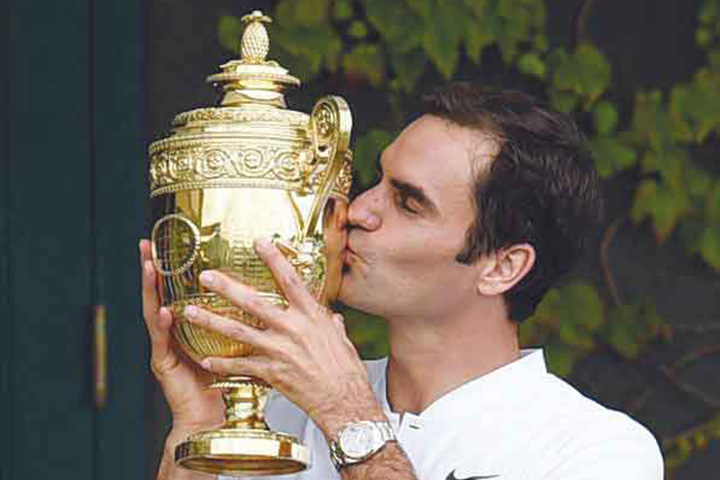
You’ve often spoken about not worrying about records, that’s not what motivates you…
RF: Well, I didn’t quite say that like I don’t care! [laughs] I said it was a great extra motivator. It was.
Is there something particularly special about getting to eight wins at Wimbledon, where it was your first, and no one has ever achieved that for the Men’s Championship
RF:
“Yes, it is very special. Wimbledon was always my favourite tournament and will always be my favourite tournament.”
My heroes walked the grounds here and walked the courts here and because of them, I think I became a better player too. So to mark history here at Wimbledon really means a lot to me, just because of all of that really. It’s that simple. So funny enough, I didn’t think of it that much throughout the day or throughout the trophy ceremony, I was more just so happy that I was able to win because it’s been a long road, it’s been an exciting road, it’s been tough at times but that’s how it’s supposed to be. So to be Wimbledon champion for an entire year now is something I can’t wait to savour and just enjoy. So it was super special and number eight obviously means a lot to me because at that level to be a part of Wimbledon history is truly amazing.
Will you now reassess your goals in a different way?
RF: Not really. I was always going to play more in the second part of the season. I wasn’t going to skip entire swings, you know, I wasn’t going to skip Asia or the American tour or the European indoors. I was always going to play as much as I possibly could. So I think I’m going to stay true to that and now we have to sit down and decide what we’re going to do with Canada or not but most likely I’ll definitely play Cincinnati and the US Open and Shanghai and then go back to the indoors. So that’s the plan for now.
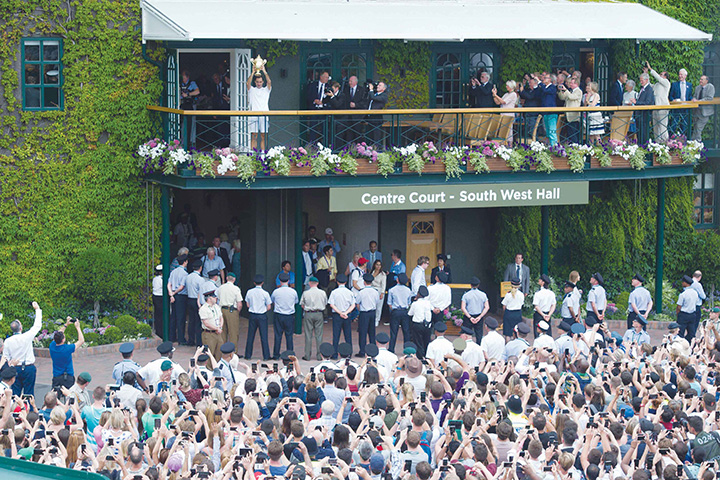
Did you believe that you would get another Grand Slam title?
RF: I truly believed, you know, and for me it was also important that my team believed it as well. So it wasn’t just like me trying to carry the team, I need the team to carry me most of the time because that’s the few percent that the team makes a difference. Maybe when you’re doubting yourself, they reassure you, if you’re feeling too good, they make sure you come back to planet Earth and put you in your place. So that’s where I think I have a wonderful team and I did ask them the question sincerely to everybody on my team if they thought I could win majors again or if I could win the biggest tournaments or if I could win against the best on a regular basis. Basically, the answer was always the same from them, that they thought if you’re 100 percent healthy and you’re well prepared and you’re eager to play then anything’s possible. But if those components are not working then it’s going to be extremely difficult. And that’s how it also played out so that we’re all right and I believed them and I had the same feeling so that’s why I think the break last year was really necessary to reassess and just get back to 100 percent physically.
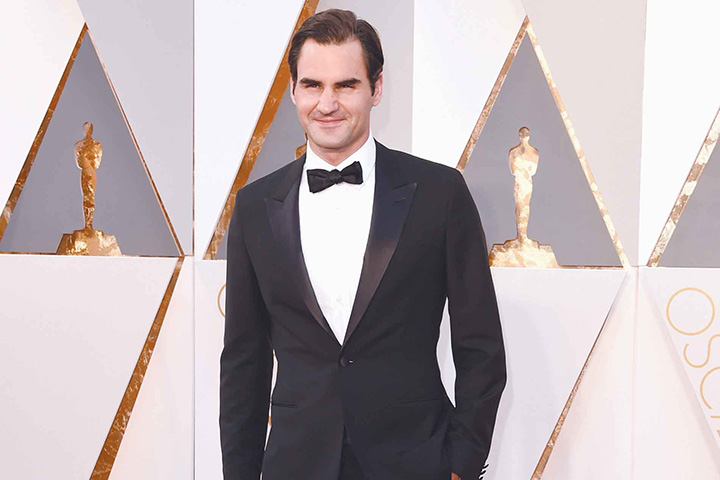
Why do you think you have had to much success in your career, what are the physical and mental abilities it takes to achieve these great records?
RF: I think at this stage it is really consistency, not shying away from the big stage, I’ve always been a big stage player, I’ve always felt like I’ve played my best on the biggest courts. I struggled on Court 18, to be honest, because of whatever reason it was, I just didn’t feel I hit the ball as good there as on Centre Court. So that was always going to be a good thing if I played the best players in the bigger matches that that would serve me well. I felt like I dreamed pretty big as a kid, I felt maybe things were possible that maybe others thought were never going to be achievable. That helped me. And I just think I trained really hard and really well and very clever over the years. If I go back to my first coach to my coaches today and the same thing with fitness all the way to today, I think every step of the way I had the right people. I have amazing people around me. My wife, my parents, who have always kept me very grounded and kept me the person that I am still today. And then in the game I guess, yes, I was blessed with a lot of talent but also I had to work for it. Talent only gets you that far really.
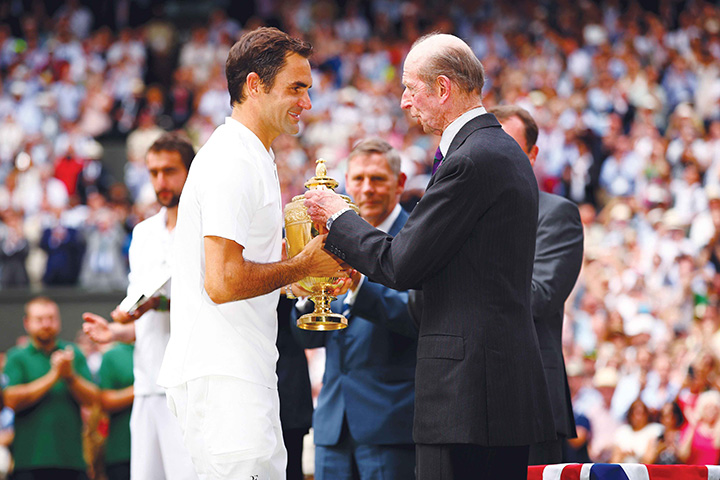
You always have very high standards and you said at 15 that you should be able to play the perfect match, which is almost impossible to achieve…
RF: Not at 15 anyway! And also not at 35 so…
But just talk about what’s been happening this year and this tournament where of course you didn’t lose a set? There’s a level of excellence that’s just incredible?
RF: Honestly, I’m incredibly surprised and how well I’m feeling as well and how things are turning out to be on the courts, how I’m managing tougher situations where my level of play is on a daily basis. I am surprised that it’s this good. I knew I could do great again maybe one day but not at this level. And I guess you would have laughed too if I told you I was going to win two Slams this year. People wouldn’t believe me if I said that. And I also didn’t believe that I was going to win two this year but yeah, it’s incredible. I don’t know how much longer it’s going to last. I have no idea but I’ve just got to always remind myself that health comes first at this point and if I do that then maybe things are actually possible I didn’t think were.
You turn 36 soon…
RF: Thanks for the reminder again! [laughs] It’s all good. No problem.
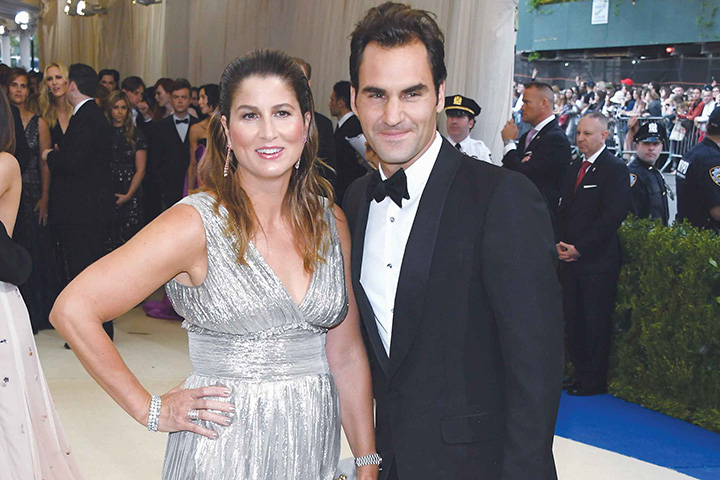
As you said, health permitting, is it possible that you could still be playing at Wimbledon when you’re 40?
RF: I mean you would think so! If health permitting and, like you say, everything’s OK and you could take 300 days off beforehand and just prepare for Wimbledon and put yourself in a freeze box and then you come out and you train a bit and you know you’re not going to be injured. Yeah, playing Wimbledon and winning Wimbledon are two separate things as well and don’t forget that so… And the problem by not playing is you take a chance on your health too in some ways because matches actually are the real measuring stick. You can practise as good as you want, you can feel as good as you want in practise. But when the pressure comes of matches and the nerves of the stomach and how you feel it, everything that happens like before the match, you can’t re-create that in a practise and you don’t know how your body is going to react to that kind of pressure when you’re moving and you’re not free and you’re tense. That’s why you always need to have the right balance between practise and matches and vacation. So at some stage you have to play a minimum of matches otherwise you’re just not going to be successful anymore and that’s going to be the interesting thing moving forward, how I’m going to be able to manage that.
Was this Wimbledon Final a slightly strange atmosphere because of the struggle on Marin’s part? And did you change your play or mentality because of what was happening on his side of the net?
RF: I couldn’t tell you right now and I didn’t know what his problem was really, to be honest, so I couldn’t tell you if he was struggling moving to his forehand or to his backhand. Because he was serving big and he was serve and volleying, so I guess movement for that reason wasn’t the biggest problem. I thought when he called the doctor first I thought maybe he was dizzy or something. So because I couldn’t tell what it was, it actually made things easier. If I saw him limping around or if I saw him pull up hurt in some place, I would have started to think, OK maybe I’ll throw in a drop shot to really check him out [laughs]. Because that’s what you do. You need to hurt him where it hurts already. So because I didn’t know and I couldn’t tell I just said, well, I’ll focus on your game and focus on your match and keep playing, the good thing is I was already in the lead. But yes, the atmosphere of course is not a five-set thriller so people want to see a tighter match, I totally get it, but I’ve had those so I’m happy it was different today. [laughs]
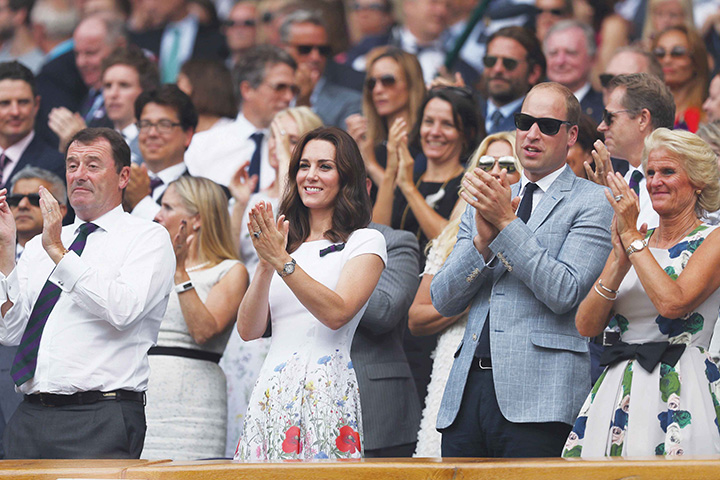
Finally, what keeps you going and what would be your advice to Andy Murray in resting a bit more?
RF: Well look, he’s younger and he has a different practise regime than I have, I’m sure. It doesn’t mean he’s practising more or less, it’s just different, he’s had a different upbringing, everything’s different. And it doesn’t mean because I took a break that everybody should take that break. To be quite honest, some players just need to play and they need to play every other day, otherwise they feel like they completely lose touch with the racket and the ball and the body goes all funny on them. So I think it’s only himself with his team who knows best. I can’t give any advice in this regard. But, for me, the break really worked wonders. I’m still surprised it did as much as it did and I had to take some tough decisions along the way, like pulling out of the French and pulling out of the clay court season. Now, in hindsight, it looks so simple. You just do that to win Wimbledon. But it’s not. I’m sure he’s going to take the right decisions moving forward and he’s still got a lot of years left to play if he’s in the mood for and we’ll see a great Andy Murray moving forward.
And what keeps you going?
RF: I don’t know. I love to play. I have a wonderful team. My wife is totally fine with me still playing, she’s my No 1 supporter, she’s amazing. Yeah, I love playing the big stages still and I don’t mind the practise, I don’t mind the travel and because I’m playing a little less actually I get more time in return. I feel like I’m working part-time these days almost, sometimes, which is a great feeling. [laughs]
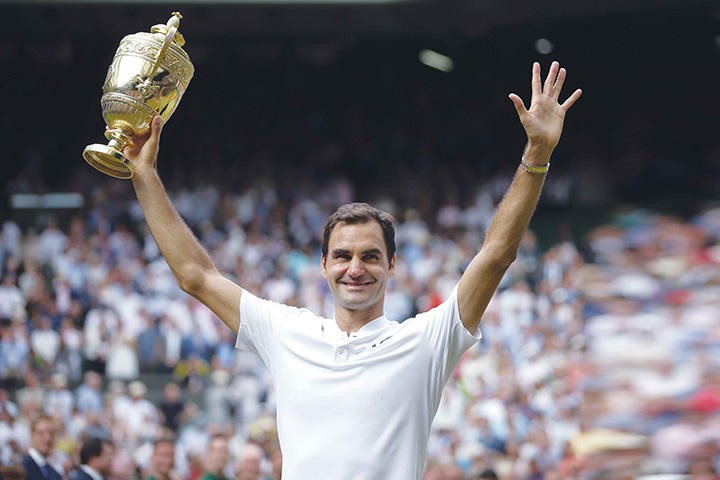
INTERVIEW: VICKY DEARDEN/HOTFEATURES
PHOTOGRAPHS: getty, AFP











































